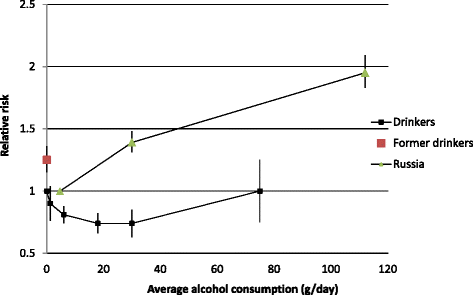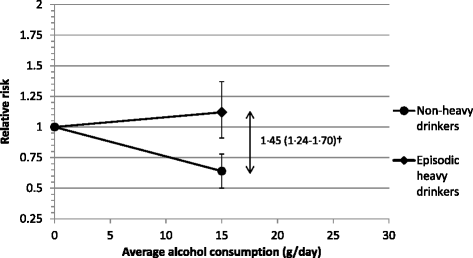Alcohol consumption, drinking patterns, and ischemic heart disease: a narrative review of meta-analyses and a systematic review and meta-analysis of the impact of heavy drinking occasions on risk for moderate drinkers - PubMed (original) (raw)
Review
Alcohol consumption, drinking patterns, and ischemic heart disease: a narrative review of meta-analyses and a systematic review and meta-analysis of the impact of heavy drinking occasions on risk for moderate drinkers
Michael Roerecke et al. BMC Med. 2014.
Abstract
Background: Alcohol consumption is a major global risk factor for mortality and morbidity. Much discussion has revolved around the diverse findings on the complex relationship between alcohol consumption and the leading cause of death and disability, ischemic heart disease (IHD).
Methods: We conducted a systematic search of the literature up to August 2014 using Preferred Reporting Items for Systematic Reviews and Meta-Analyses guidelines to identify meta-analyses and observational studies examining the relationship between alcohol drinking, drinking patterns, and IHD risk, in comparison to lifetime abstainers. In a narrative review we have summarized the many meta-analyses published in the last 10 years, discussing the role of confounding and experimental evidence. We also conducted meta-analyses examining episodic heavy drinking among on average moderate drinkers.
Results: The narrative review showed that the use of current abstainers as the reference group leads to systematic bias. With regard to average alcohol consumption in relation to lifetime abstainers, the relationship is clearly J-shaped, supported by short-term experimental evidence and similar associations within strata of potential confounders, except among smokers. Women experience slightly stronger beneficial associations and also a quicker upturn to a detrimental effect at lower levels of average alcohol consumption compared to men. There was no evidence that chronic or episodic heavy drinking confers a beneficial effect on IHD risk. People with alcohol use disorder have an elevated risk of IHD (1.5- to 2-fold). Results from our quantitative meta-analysis showed that drinkers with average intake of <30 g/day and no episodic heavy drinking had the lowest IHD risk (relative risk = 0.64, 95% confidence interval 0.53 to 0.71). Drinkers with episodic heavy drinking occasions had a risk similar to lifetime abstainers (relative risk = 1.12, 95% confidence interval 0.91 to 1.37).
Conclusions: Epidemiological evidence for a beneficial effect of low alcohol consumption without heavy drinking episodes is strong, corroborated by experimental evidence. However, episodic and chronic heavy drinking do not provide any beneficial effect on IHD. Thus, average alcohol consumption is not sufficient to describe the risk relation between alcohol consumption and IHD. Alcohol policy should try to reduce heavy drinking patterns.
Figures
Figure 1
The association of ischemic heart disease mortality with average alcohol consumption in comparison to lifetime abstention in men. Data points taken from published meta-analyses [15,33,39]. All point estimates and confidence intervals were obtained from categorical meta-analyses stratified by alcohol exposure. The Russian estimates were pooled from Zaridze et al. [40,41].
Figure 2
Ischemic heart disease incidence by drinking pattern among drinkers with average consumption of <30 g/day in comparison to lifetime abstention. Please see Additional file 1: Table S1, Figures S3 and S4 for details. †Taken from Roerecke & Rehm [26].
Similar articles
- Heavy drinking occasions in relation to ischaemic heart disease mortality-- an 11-22 year follow-up of the 1984 and 1995 US National Alcohol Surveys.
Roerecke M, Greenfield TK, Kerr WC, Bondy S, Cohen J, Rehm J. Roerecke M, et al. Int J Epidemiol. 2011 Oct;40(5):1401-10. doi: 10.1093/ije/dyr129. Epub 2011 Sep 23. Int J Epidemiol. 2011. PMID: 22039198 Free PMC article. - Ischemic heart disease mortality and morbidity rates in former drinkers: a meta-analysis.
Roerecke M, Rehm J. Roerecke M, et al. Am J Epidemiol. 2011 Feb 1;173(3):245-58. doi: 10.1093/aje/kwq364. Epub 2010 Dec 14. Am J Epidemiol. 2011. PMID: 21156750 Free PMC article. - Irregular heavy drinking occasions and risk of ischemic heart disease: a systematic review and meta-analysis.
Roerecke M, Rehm J. Roerecke M, et al. Am J Epidemiol. 2010 Mar 15;171(6):633-44. doi: 10.1093/aje/kwp451. Epub 2010 Feb 8. Am J Epidemiol. 2010. PMID: 20142394 Review. - The cardioprotective association of average alcohol consumption and ischaemic heart disease: a systematic review and meta-analysis.
Roerecke M, Rehm J. Roerecke M, et al. Addiction. 2012 Jul;107(7):1246-60. doi: 10.1111/j.1360-0443.2012.03780.x. Epub 2012 Mar 21. Addiction. 2012. PMID: 22229788 Free PMC article. Review. - Chronic heavy drinking and ischaemic heart disease: a systematic review and meta-analysis.
Roerecke M, Rehm J. Roerecke M, et al. Open Heart. 2014 Aug 6;1(1):e000135. doi: 10.1136/openhrt-2014-000135. eCollection 2014. Open Heart. 2014. PMID: 25332827 Free PMC article.
Cited by
- Knowledge gaps and acceptability of abbreviated alcohol screening in general practice: a cross-sectional survey of hazardous and non-hazardous drinkers.
Isted A, Fiorini F, Tillmann T. Isted A, et al. BMC Fam Pract. 2015 Jun 20;16:72. doi: 10.1186/s12875-015-0290-1. BMC Fam Pract. 2015. PMID: 26092292 Free PMC article. - Reduction in World Health Organization Risk Drinking Levels and Cardiovascular Disease.
Knox J, Scodes J, Witkiewitz K, Kranzler HR, Mann K, O'Malley SS, Wall M, Anton R, Hasin DS; Alcohol Clinical Trials (ACTIVE) Workgroup. Knox J, et al. Alcohol Clin Exp Res. 2020 Aug;44(8):1625-1635. doi: 10.1111/acer.14386. Epub 2020 Jul 3. Alcohol Clin Exp Res. 2020. PMID: 32619058 Free PMC article. - Liver holidays? A meta-analysis of drinking the same amount of alcohol daily or non-daily and the risk for cirrhosis.
Llamosas-Falcón L, Tran A, Jiang H, Rehm J. Llamosas-Falcón L, et al. Drug Alcohol Rev. 2023 Jan;42(1):119-124. doi: 10.1111/dar.13563. Epub 2022 Oct 24. Drug Alcohol Rev. 2023. PMID: 36274528 Free PMC article. - Factors Affecting the Intention to Modify Lifestyle in the Cardiovascular Disease Risk Group in Korea.
Shim J, Kim K. Shim J, et al. Healthcare (Basel). 2021 Apr 22;9(5):496. doi: 10.3390/healthcare9050496. Healthcare (Basel). 2021. PMID: 33922181 Free PMC article. - Associations of Lifestyle, Medication, and Socio-Demographic Factors with Disability in People with Multiple Sclerosis: An International Cross-Sectional Study.
Jelinek GA, De Livera AM, Marck CH, Brown CR, Neate SL, Taylor KL, Weiland TJ. Jelinek GA, et al. PLoS One. 2016 Aug 25;11(8):e0161701. doi: 10.1371/journal.pone.0161701. eCollection 2016. PLoS One. 2016. PMID: 27560626 Free PMC article.
References
- Go AS, Mozaffarian D, Roger VL, Benjamin EJ, Berry JD, Blaha MJ, Dai S, Ford ES, Fox CS, Franco S, Fullerton HJ, Gillespie C, Hailpern SM, Heit JA, Howard VJ, Huffman MD, Judd SE, Kissela BM, Kittner SJ, Lackland DT, Lichtman JH, Lisabeth LD, Mackey RH, Magid DJ, Marcus GM, Marelli A, Matchar DB, McGuire DK, Mohler ER, 3rd, Moy CS, et al. Heart disease and stroke statistics-2014 update: a report from the American Heart Association. Circulation. 2014;129:e28–e292. - PMC - PubMed
- Nichols M, Townsend N, Scarborough P, Rayner M. Cardiovascular disease in Europe: epidemiological update. Eur Heart J. 2013;34:3028–3034. - PubMed
- Lozano R, Naghavi M, Foreman K, Lim S, Shibuya K, Aboyans V, Abraham J, Adair T, Aggarwal R, Ahn SY, Alvarado M, Anderson HR, Anderson LM, Andrews KG, Atkinson C, Baddour LM, Barker-Collo S, Bartels DH, Bell ML, Benjamin EJ, Bennett D, Bhalla K, Bikbov B, Bin Abdulhak A, Birbeck G, Blyth F, Bolliger I, Boufous S, Bucello C, Burch M, et al. Global and regional mortality from 235 causes of death for 20 age groups in 1990 and 2010: a systematic analysis for the Global Burden of Disease Study 2010. Lancet. 2012;380:2095–2128. - PMC - PubMed
- Murray CJ, Vos T, Lozano R, Naghavi M, Flaxman AD, Michaud C, Ezzati M, Shibuya K, Salomon JA, Abdalla S, Aboyans V, Abraham J, Ackerman I, Aggarwal R, Ahn SY, Ali MK, Alvarado M, Anderson HR, Anderson LM, Andrews KG, Atkinson C, Baddour LM, Bahalim AN, Barker-Collo S, Barrero LH, Bartels DH, Basáñez MG, Baxter A, Bell ML, Benjamin EJ, et al. Disability-adjusted life years (DALYs) for 291 diseases and injuries in 21 regions, 1990–2010: a systematic analysis for the Global Burden of Disease Study 2010. Lancet. 2012;380:2197–2223. - PubMed
- Lim SS, Vos T, Flaxman AD, Danaei G, Shibuya K, Adair-Rohani H, Amann M, Anderson HR, Andrews KG, Aryee M, Atkinson C, Bacchus LJ, Bahalim AN, Balakrishnan K, Balmes J, Barker-Collo S, Baxter A, Bell ML, Blore JD, Blyth F, Bonner C, Borges G, Bourne R, Boussinesq M, Brauer M, Brooks P, Bruce NG, Brunekreef B, Bryan-Hancock C, Bucello C, et al. A comparative risk assessment of burden of disease and injury attributable to 67 risk factors and risk factor clusters in 21 regions, 1990–2010: a systematic analysis for the Global Burden of Disease Study 2010. Lancet. 2012;380:2224–2260. - PMC - PubMed
Publication types
MeSH terms
LinkOut - more resources
Full Text Sources
Other Literature Sources
Medical

